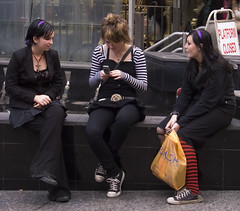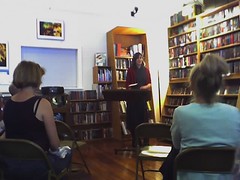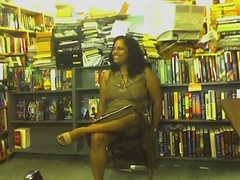Was just reading about Ghost Town, the texting novella or short story that comes to you on your mobile phone. From the article, the story doesn’t seem to be adapted to its medium. Or, well… read this from youthnoise and see for yourself. I’m super curious.
A novel adapted to the medium of cell phones and texting would be more like a play with very long pauses, a long-running larp, fiction blogs, or the evolution of gossip into an art form. I could see the beautiful structure – a character from the story texts you a whole bunch – crises build – other characters start to chip in to give you their side – incidents would happen in sensible realtime. The story itself would be mostly deduced and imagined from ellipsis.
Perhaps all the texted replies from all over the world would be collected and juxtaposed on a site. You’d get a hundred thousand replies of “OK” or “Whr RU” for every line of the story. Maybe replies would get ranked on interestingness. The replies might or might not be interesting to meta-followers of the texted novel’s happening. The main point of the novel would be the experience of it.
Days would go by. The characters buzz you from your pocket. What will happen? Why did TinyE say that about Slugface? OMG the cops just came to the party! Cameron has disappeared! Or whatever. At a crisis point you’d probably get messaged from several different characters about it. There would be a lot of suspense, multiple points of view on the same event, and unreliable narrators.
The reader could also be involved by the posing of temporary ethical dilemmas, like a kind of scary character wanting to crash at your house, or in desperation, asking you to do something questionable, and then a few minutes later changing their mind and taking it back. But during those few minutes you’d be thinking “Would I really let Slugface and her baby that she kidnapped from its abusive grandparents stay in my room while they’re on the run from the police?”
I’d love to try this! Now I can’t stop thinking about it… Put in some weird reality-warping fantastic elements… make it get weirder and weirder. A teenage science fiction novel… super political… should definitely involve the war and some teenage protagonist overseas… You know who would be the ideal person to write it — Holly Black or Tricia Sullivan…. Or Heidi Wyss, author of Gormglaith.
I love the idea of new literary genres evolving for cell phones. Seriously – (More seriously than this texting poem contest)
– think about gossip as an art form.
A truly sophisticated texting novel would know, from social networking software and analysis of your social networks, who your friends are. And it could send slightly different version of the textonovela (sorry, am stretching for a handy word for it – there is probably a nice one in japanese we could borrow and use) to you and your closest friends. Then you’d talk about it. I can’t believe Slugface told you that! She told me… blah blah blah. That would be great dramatic entertainment. Again, I think of how involved my friends and I became in Plain Layne’s (fictional) life and how we’d talk about her (and what the commenters said) in addictive soap-opera style, as if she were our real life trainwrecking mutual friend.


